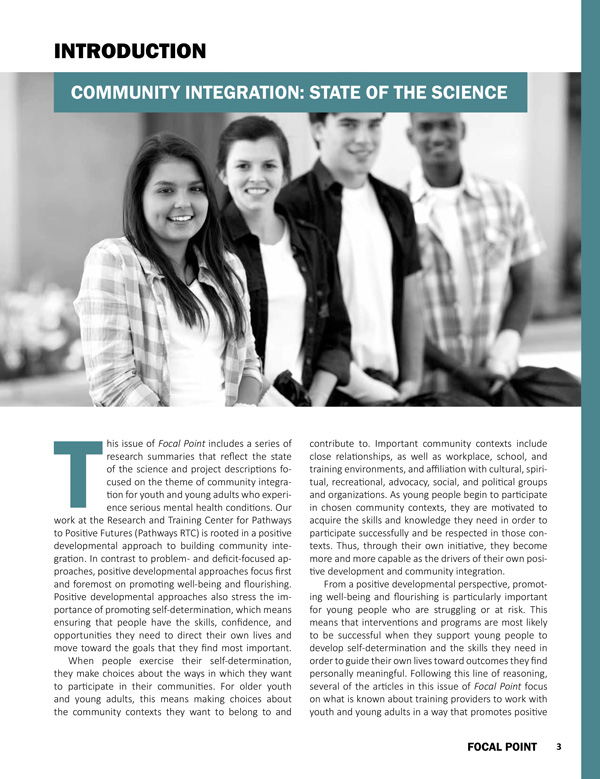
Abstract: This introduction from Pathways RTC Director Janet Walker explains how each article in this issue addresses the state of the science in the topic of community integration of transition-age youth and young adults with mental health conditions.
"Introduction: Community Integration: State of the Science" (2018)
By Janet Walker
This issue of Focal Point includes a series of research summaries that reflect the state of the science and project descriptions focused on the theme of community integration for youth and young adults who experience serious mental health conditions. Our work at the Research and Training Center for Pathways to Positive Futures (Pathways RTC) is rooted in a positive developmental approach to building community integration. In contrast to problem- and deficit-focused approaches, positive developmental approaches focus first and foremost on promoting well-being and flourishing. Positive developmental approaches also stress the importance of promoting self-determination, which means ensuring that people have the skills, confidence, and opportunities they need to direct their own lives and move toward the goals that they find most important.
When people exercise their self-determination, they make choices about the ways in which they want to participate in their communities. For older youth and young adults, this means making choices about the community contexts they want to belong to and contribute to. Important community contexts include close relationships, as well as workplace, school, and training environments, and affiliation with cultural, spiritual, recreational, advocacy, social, and political groups and organizations. As young people begin to participate in chosen community contexts, they are motivated to acquire the skills and knowledge they need in order to participate successfully and be respected in those contexts. Thus, through their own initiative, they become more and more capable as the drivers of their own positive development and community integration.
From a positive developmental perspective, promoting well-being and flourishing is particularly important for young people who are struggling or at risk. This means that interventions and programs are most likely to be successful when they support young people to develop self-determination and the skills they need in order to guide their own lives toward outcomes they find personally meaningful. Following this line of reasoning, several of the articles in this issue of Focal Point focus on what is known about training providers to work with youth and young adults in a way that promotes positive development, self-determination, and community integration. Additional articles focus specifically on peer support providers, and the unique roles that they can play in promoting self-determination and community integration among youth and young adults who experience serious mental health conditions.
Several other articles focus on youth- and young adult-serving agencies and how they can promote positive development by providing opportunities for young people to participate in improving services. One pair of articles describes research related to best practices for agencies to use as they seek to involve young people in advising and decision making. Another article focuses specifically on the key role that youth-run organizations play in helping agencies and systems ensure that their work more consistently promotes positive youth development.
Finally, several of the articles in this issue focus on important interpersonal relationships through which young people are connected to others. One article summarizes the research on social networks, and a second discusses interventions and programs that are intended to enhance the social networks and community integration of young people affected by early psychosis. Another article focuses specifically on the relationships between young people and their families, and how these relationships can be strengthened so that families can better support their young people to live successfully in the community.
Space in Focal Point is limited, and this has meant that we are only able to include short versions of each of these articles. However, more detailed versions of most of the articles – including extensive reference lists – are available on the Pathways RTC website. We encourage you to take a look at these longer versions for further detail and a more comprehensive treatment of each of these important topics.
Suggested Citation
Walker, J. (2018). Introduction: Community Integration: State of the Science. Focal Point: Youth, Young Adults, and Mental Health, 32, 3-4. Portland, OR: Research and Training Center for Pathways to Positive Futures, Portland State University.